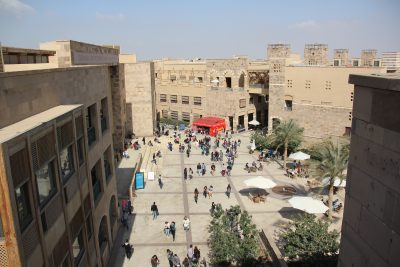By Nada Mostafa
Follow @nadamnaguib
The ad-hoc committee formed at the start of the semester to look into the quality of education at AUC found wide gaps between faculty and student perceptions, it was revealed at a University forum on May 6.
The committee produced a report not only detailing the quality of education at AUC, but also providing proposals for reform and recommendations for improvement, according to Provost Ehab Abdelrahman.
The results from the report were presented at the forum for discussion.
“Our mandate was to raise the quality of education at AUC, but we were also asked to devise mechanisms that enhance and improve good teaching practices,” said Associate Provost for Transformative Learning and Teaching and Chair of the Committee Aziza Ellozy.
The presentation and report were mostly based on a survey given to students, faculty, parents and university Chairs, tailored specifically for each group.
“Before [distributing] the survey, we had focus groups with parents and students, and the results of the focus groups were the ones that fed the questions we put on the survey,” Ellozy added.
The most alarming finding from the survey were the wide discrepancies between how often students said they were exposed to certain aspects of learning, such as exposure to real-life problems, in their courses and how often faculty said that they incorporate these aspects in their teaching.
Students across all standings consistently said that of the 19 learning aspects, they were only somewhat exposed to each of them.
However, the survey revealed that faculty members themselves believe that they incorporate each of these 19 aspects to a large extent.
“That is where the contrast lies – between how students perceive [education] and how faculty perceive it,” said Ellozy.
Some students expressed concern with the limitations of resources and facilities on campus as a significant barrier to their learning experience.
“In engineering, we rely a lot on our labs, but we need good lab equipment,” said Samer Basta, a computer engineering junior.
He added that the problem lies in having to constantly replace equipment even after having started their experiments after realizing that the equipment is faulty.
Among the main points that the research revealed was that both students and faculty agreed that the quality of teaching was the most important factor determining quality of education.
However, students added that the content of major courses and liberal arts were just as important as quality of teaching.
“I never thought I’d like philosophy but I ended up liking it despite being forced to take it as a core course,” said Farah Sherif, an Economics sophomore.
The next point in the forum was how often students said they were challenged at AUC.
While the results from freshmen indicated that they are somewhat high, students said
they got less and less challenged as they advanced further in their academic career.
The only exception were graduating seniors, who said they were very challenged by course content.
“Here something is di erent; they seem to be happier. They’re very happy they’re getting out,” joked Ellozy.
“But the reality is that this is probably where they are doing their most challenging work or their theses.”
After the end of their exploratory research, the committee had to present a framework to improve the quality of education.
“The very first recommendation is something to do with the teaching evaluation process,” said Ellozy.
“We have to develop a comprehensive evaluation process.”
Further recommendations were to establish a set of department expectations for high quality of teaching, establish a faculty development program and address the lack of English language pro ciency among faculty.
